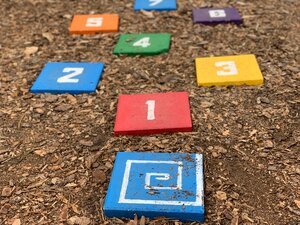What is Neurofeedback?
From a mindful point of view, there could be a lot of value in the possible state of whelm in this evolved wordy context. Whelmed in this sense could mean - content, at peace, perfectly challenged, inflow, or ‘in the zone’ perhaps Certainly, a state of mind that would be nice to be in more often, rather than being over or under.
It’s time to tell someone I’m not OK - September 2021
The way NOT OK shows itself is rarely obvious. When asked ‘how are you?’ most people, that are NOT OK, are still going to say they are ‘fine’, ‘good thanks, and you?’, they may even overcompensate with a ‘living the dream’. We might do this, partly, because we are on autopilot when responding, maybe we’re kind of conditioned to respond that way, and because it feels like it’s way too much to open up and say (to a somewhat trivial greeting) things that are sensitive, complex and intensely personal.
The Wonder of Just Being Whelmed - September 2021
From a mindful point of view, there could be a lot of value in the possible state of whelm in this evolved wordy context. Whelmed in this sense could mean - content, at peace, perfectly challenged, inflow, or ‘in the zone’ perhaps Certainly, a state of mind that would be nice to be in more often, rather than being over or under.
We Shouldn’t Leave Lonely Alone. - September 2021
In the 7 minutes it takes to read this article, around the world, about 140 people will be newly diagnosed with dementia. Every three seconds another person is diagnosed. The number of people grows each day and each year. It’s a huge challenge for humankind and it’s only getting bigger.
Your Armour for Anxiety - August 2021
There are so many ways to describe anxiety. There are so many ways to experience it. So many ways it gets inside, so many ways it shows, and so many ways to try and hide it. It’s exhausting. It’s stressful. It’s a thief. Of time. Of moment. Of person.
The Personality of Your Pain - July 2021
Your pain has a colour, a shape, a size, a volume, loads of feelings, things that make it bad, things that make it better, places it likes to be, a memory, it has a whole damn personality…
If You Have a Minute, You Can Stress Down Now - July 24th 2021
Possibly the fastest and most usable shift in your nervous system happens when you yawn. You move from the stressed ‘fight, flight, freeze’ to relaxed ‘rest and digest’ in a moment. Sitting with that moment for a minute can start to rebalance your nervous system and calm your quick brain.
You and That Thing!? - June 2021
Just how much time we are spending on, and indirectly surrounded by, screens is scary. They are everywhere. The Royal Children’s Hospitals Health poll reveals excessive screen time is the #1 health concern for parents in 2021. So, if the problem is right up there at the top, surely we’ve got to get to the bottom of it, and do something about it!
What Happened and What's Happening? - June 2021
Because, at the soul of it, perhaps we don’t want to know it. It can feel horrible and impossible to talk about devastating things that have happened to people, it is overwhelmingly hard to trust enough to ‘find the words’. There is an unquantifiable range in the trauma experience. The immenseness of trauma may immediately feel as though it is already ‘too much’. And it is exactly this potentiality that is key.
4 Connections to Drive Change - June 2021
Likely the first thing we think of with the word ‘connection’ is people. Connections to our families, friends, mates, groups, communities, and culture. The superhuman glue that holds our world together. But important connections start between tiny things in our world and in ourselves.
Your Migraine, Your Way, Your Possibilities - June 2021
Migraines are intensely personal. From chatting with many individuals who experience all kinds of different migraines, a common thread is often the only way to get through them is on your own. The presence of others and their sounds, smells, their touching, their ideas, even their well-meaning attempts to soothe you can often make the migraine worse.
Family Brain Health Tips - May 2021
The health of the family is vital to the health of the individual. The way a family lives powerfully shapes the brain development and lifelong brain health of every single member.
Neurons Need Nature - May 2021
Deep down we are all in love with nature, we just might need to get out and woo the wild world a little more to really feel the affection. The term ‘biophilia’ captures our innate love of life and the natural world. There is a tree out there that has been waiting 100 years for your perfect embrace, get out there and feel the love.
Embrace Difference For a Bigger Brain and a Better Heart - April 2021
It is an altruistic theme, set to inspire a big global shift, this year for Autism awareness. The call to us all to ‘Embrace Difference’ evokes the deep human feelings of wanting to be and do better for a better world. It is a call we should listen to and act on.
The Neuroscience of Restriction - February 2021
First, we are alarmed, we are told there is something serious to worry about, we enter the intense stress state of ‘fight, flight, freeze’, then the action we are told to do is freeze – that’s your only option, and that doesn’t work well for most of us. It’s been going on for so long, and in some parts of the world so severe, that there would be identifiable changes in brain structure and function as a result.
Summer Holiday Survival Guide (Part 2) - January 2021
In this article we are going to explain why each of the activities on this long list are brilliant for your beautiful brains. We have gathered some of what neuroscience has to say about the benefits of what you are getting up to over the summer break.
Summer Holiday Survival Guide (Part 1) - December 2020
OK, Team…we’ve got, give or take, 6 weeks or 42 days of school holidays to survive, thrive and make some happy holiday Family memories!
2020 has been a massive year! So we are going to go big and serve up 42 inspirations for you to whack on the fridge and check off those that sound like great ideas for your Family. In our next article, we are going to explain why these activities are brilliant for your brains too. We have done our best not to repeat any suggestions from last year, so if you are looking for even more you can always download the 2019 list and pop a big bright magnet on it as well.
Preparing the Layers for Perinatal Health - November 2020
Everything that is involved in preparing for and having a new human enter your world should be able to be on the table, no judgement. This is a time of mammoth change, especially if this is your first child. It is a transition period in your life that is worthy of even more dedicated time and energy as getting married; building a home; or learning to drive…having a baby involves elements of ALL big life events in ONE.
Global ADHD Awareness Month - October 2020
Is the prevalence of ADHD higher now than at any point in history?
The evidence leans both ways on this one. In the UK it appears to have plateaued; in the US it is on the rise; in Japan and Finland rates of diagnosis are very low. Regardless of the debate on the ups or downs, we know ADHD is the most common brain-based challenge facing Australian children and adolescents.
Dementia Action Week - September 2020
In a world that seems full to bursting with humans all shouting about “Right now!” and “Change today!”, it can be hard to find the right words to help people to think about the far off (but not that far) future. When we talk about dementia, most evidence suggests that informed preventative thinking and acting, right now, is the wisest choice and most significant action we can take for a brighter tomorrow.




















